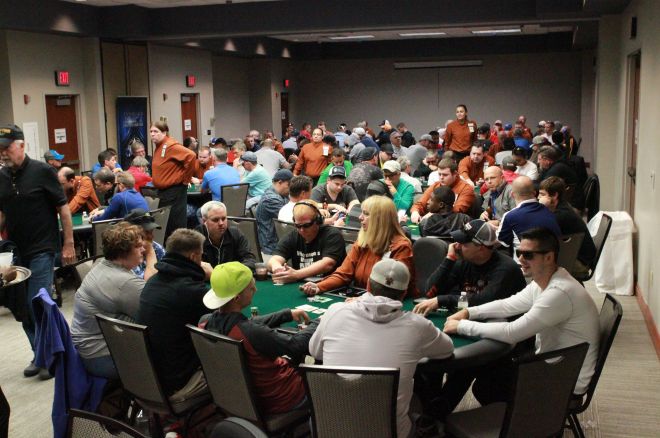Want to Move Up, But Do You Suffer from ��Small Stakes Paralysis��?

If you have been around small stakes cash games for a while (live or online), then you will have probably noticed certain people playing the same limits sometimes for years on end. Perhaps I am describing you as well. I call this ��small stakes paralysis,�� a phenomenon affecting players who for whatever reason get stuck at a low limit and never seem to move up.
Now it should be noted that there is nothing inherently wrong with this. Many people are happy to grind out a steady profit at the same low stakes. After all, the faces are familiar, the variance is predictable, and they know exactly what to expect. If this is the case for you, then you probably won��t get much from this article.
But I think most poker players do view moving up in stakes as a goal. Perhaps not everybody wants to play at the nosebleeds, but most would probably like to play at least a few limits higher than they currently do. Why? Because the money gets a lot better the higher you move up. Also, importantly, the game becomes more challenging and interesting.
In this article I am going to discuss a couple of the most common reasons why people suffer from ��small stakes paralysis�� and what you can do to prevent it from happening to you.
Reason #1: Don��t Have the Bankroll
This is probably the most common reason why people do not move up. They simply don��t have the bankroll to play at a higher limit. But if you are winning at your current stakes, then this situation should sort itself out in time.
For instance, say you currently play online at NL10 ($0.05/$0.10). Even if your win rate is relatively small (e.g., 2 big blinds per 100 hands), this means that you will profit a full buy-in (100 BB) every 5,000 hands. This might not seem like much, but if you play even just a moderate number of tables on a consistent basis it is not too difficult to pump out 50,000 hands a month, meaning you��re adding 10 buy-ins to your bankroll every single month. (I am not even including rakeback here which may add a few more buy-ins as well.)
Typical low volume players with these stats should be able effectively to double their bankroll and move up every few months. Why is this so often not happening then?
Frequent cashouts are usually the reason why. If you want to move up in stakes, then you��re going to have to stop making cashouts. If you��re playing at the micros, then it probably isn��t your job anyway, so there is no reason why you should need the money, especially if you genuinely want to make the move to the next-highest stakes.
In order to have success in poker and rise up the limits, you need to separate your real life bankroll from your poker bankroll completely. Your real life bankroll is what you use to pay the bills and buy things. Your poker bankroll, on the other hand, is capital for your poker career. Like any other small business, all of the profits should be reinvested back into the business.
Unless there is some sort of emergency, your poker bankroll should only ever be used for playing poker. If you keep dipping into it when you don��t really need to, then you are robbing yourself of the chance to move up and make some real money in this game.
Reason #2: Don��t Have the Confidence
The other big issue that often holds many people back is a lack of confidence. Moving up is a little bit scary for everybody. There is more money on the line, the regulars are all unfamiliar, and there are many other unknown factors in play. These facts alone are enough to prevent many people from ever taking a shot, especially if they have had a bad experience trying to do so in the past.
The main thing that you always have to remember, though, is that the regulars at the higher stakes are often only slightly better than the ones at your current limit. And the fish... I mean, c��mon �� fish are fish at any limit.
One of the biggest keys to moving up the stakes successfully is to stop defeating yourself mentally before you even play your first hand. If you are winning at your current stakes right now, then I can all but guarantee you that you at least have the potential to be a winner at the next higher one as well.
Will your win rate be lower at the higher stakes? Yes, probably. However, this will be made up for and more by the larger money amounts (and the higher rakeback rewards if you are playing online). Also, once you gain more information on your opponents over time, then you will be able to figure out better ways to beat them and increase your edge even more.
But What if You Aren��t Currently Winning?
So far in this article I have been discussing winning poker players. But it is a simple reality of the game that most people lose in the long run after the rake. So what should those players do?
Well, it is also an unfortunate truth that there there is no strategy on earth for moving up the limits that will work for a losing poker player. In fact, their results will only be worse in the long run.
Many people make the mistake of thinking that if they just move up to higher limits where the regulars are better and ��more predictable�� that they will somehow be able to start winning. Sounds good in theory, but it is very inaccurate in reality.
If you are currently having problems beating the weaker opposition at your current stakes, then playing against more skilled opponents is not the answer. The real answer is finding the holes in your game that are currently holding you back and addressing them.
These could be strategy leaks or they could be mental game issues. The latter is more difficult to address, because only you know if tilt in particular is a big issue in your game and only you can truly fix it as well.
However when it comes to improving your strategy, there has never been more information out there to help you improve. I am talking about poker strategy websites, poker forums, books, video training sites, coaching, study groups, and more. For some tips in this regard, I recently wrote an in-depth article on my blog which details all of the top ways to improve your poker game in 2015.
Final Thoughts
You don��t have to be that guy who two years from now is still playing $1/$2 in the casino or NL10 online. The money is always going to be better the higher that you play. And also the game is simply more challenging and interesting on many levels as you advance in stakes.
Again, though, many people are completely fine grinding out a steady profit at their current stakes. If this is you, then there is absolutely nothing wrong with that. You should just continue along and perhaps look for ways to improve your results at your current stakes even more.
For everybody else, though, if moving up the stakes is a priority for you, then you need to make sure that you let your poker bankroll grow naturally no matter what. Also, you need to view the higher limits in a more accurate way. The opponents are only slightly better and your potential profit is a lot higher.
Don��t get me wrong �� it might still take a few tries to be successful when moving up. Sometimes short-term variance won��t be on your side. Even top players can fail multiple times because of this very reason.
The key is not to give up. If things don��t go well at first, then just move back down to your old stakes for a while and grind back what you lost. Try again at a future date and eventually it will click. Once you stick with it and become a new regular at your new higher stakes, you will probably wonder what all the fuss was about in the first place.
Nathan ��BlackRain79�� Williams is the author of the popular micro stakes strategy books, Crushing the Microstakes and Modern Small Stakes. He also blogs regularly about all things related to the micros over at www.blackrain79.com.
Want to stay atop all the latest in the poker world? If so, make sure to get PokerNews updates on your social media outlets. Follow us on Twitter and find us on both Facebook and Google+!









